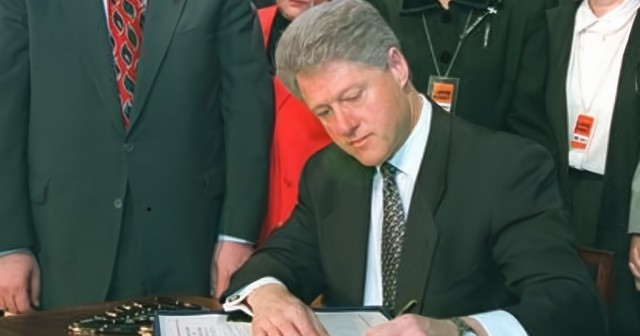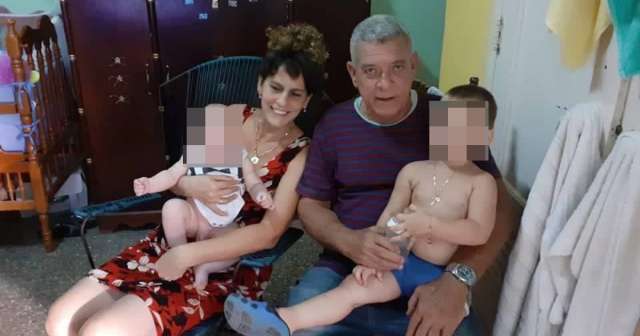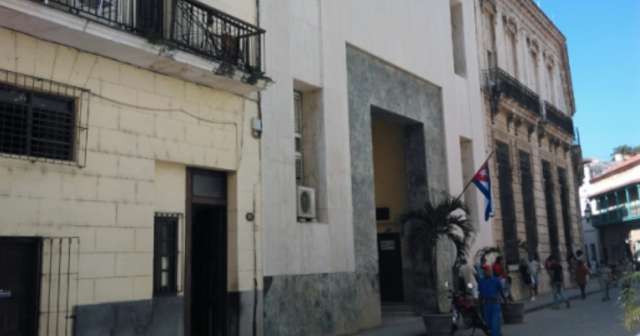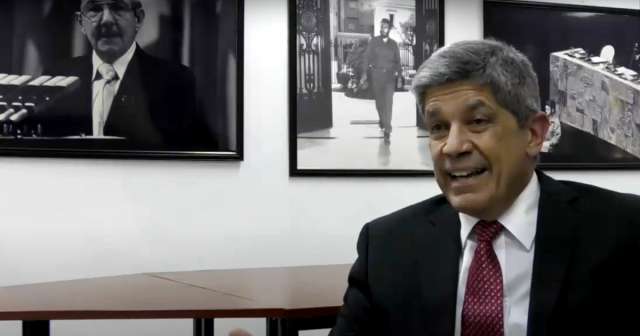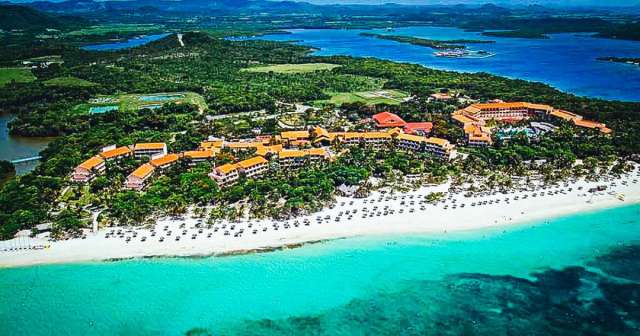The new wave of protests has been unleashed in the country and Cuban propaganda and officials have not hesitated to blame—as they always do—the United States Government.
As part of the script, Humberto López—the infamous member of the Central Committee of the Communist Party of Cuba and commentator on Cuban state television—once again left some comments in the broadcast of the television magazine Buenos Días on March 18, 2024.statements that demonstrate their willingness to lie and knowingly manipulate.
López declared—referring to the United States Government—: “they are the ones who suffocate us; "They, today as always, encourage and foment divisions, divisions not only here, they foment them in any part of the world where a conflict implies benefits or where some people dare, like us, to think for themselves."
In this way, the commentator linked the protests with the historical "intentions" of the United States Government to control Cuba. It sought to demonstrate the lack of agency of the Protestants and the "possible" alignment with the supposed interests of the United States. Interests that, according to López, could be disastrous for the Cubans who were protesting.
In that sense, the communist militant said:
«We must not forget that in the hypothetical case, which is not going to happen, [that] they put an end to the Revolution, there is (...) a Helms-Burton Law for Cuba. Cuba, in that hypothetical case, would have a coordinator. An American who is going to direct everything (...). And that coordinator, as his first task, has to return to the Batista thieves and murderers everything that they had stolen from this town (...). "It is perhaps where you live today, it is perhaps your house, where your school is, even the land must be returned."
Humberto López's parliament—no surprise—is FALSE.
American coordinator
TheCuban Liberty and Democratic Solidarity Act (Helms-Burton Act) was a law promoted in 1996 by the Cuban lobby in the United States Congress after theshooting down of the Brothers to the Rescue planes. The regulations aim, at a certain time, to codify the sanctions system and US policy in relation to Cuba. It establishes the conditions that must be met on the island for the embargo to be lifted and relations between Havana and Washington to be fully reestablished.
Section 207 of the Law ensures that the United States Congress considers that in order to fully resume economic and diplomatic relations between Cuba and the United States, an essential condition must be met, the "satisfactory resolution" of the claims. of property formulated against "a Cuban Government recognized by the United States."
However, contrary to what the propagandist says, the Helms-Burton Act does not establish the appointment of a US administrator to oversee the transition in Cuba; but rather establishes requirements on how and when it can be considered that there is a transitional government or an elected one on the island. But it does not institute the establishment of a US intervener to guide the process.
In fact, the Helms-Burton Act's main mention of an American "coordinator" is in relation to the provision of "economic assistance" to Cuba. According to the legislation, once the president of the United States determines, using the criteria established in the law, that a transitional or elected government has emerged in Cuba, he can implement a plan or strategy to distribute economic assistance on the island.
The law specifies that aid will be channeled through US federal agencies, non-governmental organizations, and private and voluntary organizations. In addition, it grants the president of the United States the power to designate a "coordinating official" who will be responsible for implementing the strategy for distributing economic assistance, for ensuring rapid and efficient distribution, for ensuring adequate coordination among the US agencies that provide assistance, as well as supervise and resolve any dispute between them.
The Helms-Burton Act also establishes that only when a democratically elected Government is in power in Cuba can a United States-Cuba Joint Council be created to ensure coordination between the Government in Washington and the private sector, to promote development based on the market and to organize regular meetings between representatives of the private sectors of both countries with the aim of facilitating bilateral trade.
Lose the houses
While it is clear from the Helms-Burton Act that the resolution of property claims is an essential condition for the lifting of the lien, not all claims have equal protection under the law nor is the return of property — some do not even exist or are not what they were—the main legal solution that the US has contemplated.
In 2004, the United States Agency for Development (USAID) gave a grant of nearly USD 400,000 to the American University of Creighton—specifically its Law School—to propose possible ways to resolve claims on properties in a future transition scenario in Cuba. The investigation was published for the first time in 2007 within the framework of the transfer of power between Fidel and Raúl Castro and was updated in 2015, when the official transfer of powers between the youngest of the Castros and Miguel Mario Díaz-Canel Bermúdez was announced.
Creighton University research titled “Report On The Resolution Of Outstanding Property Claims Between Cuba & The United States» divides claims for nationalized properties into three groups, mainly in the 1960s.
The first group of claims to property nationalized by Castroism is in the hands of American national claimants. That is, individuals and corporations that were US citizens or registered as such at the time of the expropriation. Claimants certified their claims through the Federal Claims Settlement Commission (FCSC).
In 1964, the United States Congressestablished the first Cuban Claims Program, under which the FCSC was granted authority to determine the validity and amount of claims by U.S. citizens against the Government of Cuba for the expropriation of their properties since January 1, 1959. The The FCSC Cuban Claims Program was active between 1966 and 1972. During that time, it received 8,816 claims—1,146 from U.S. corporations and 7,670 from individual citizens. It certified 5,911 of those claims, with a total amount of 1.8 billion; denied 1,195 claims, with a total amount of 1.5 billion; and dismissed without consideration (or saw withdrawals) 1,710 claims.
In July 2005, Condoleezza Rice—US Secretary of State—solicitous FCSC to conduct a Second Cuban Claims Program to adjudicate and certify claims for expropriation of property of U.S. citizens made by the Cuban Government after May 1967. The Commission established a six-month filing period during which five claims, of which only two were certified as valid. The first is equivalent to approximately 51 million dollars, and the second is equivalent to 16,000 USD. The certifications were accepted without objection and presented to the Secretary of State for use in future negotiations with the Cuban Government.
The second group of property claims is held by Cuban-American exiles. The members of that group were Cubans at the time of the expropriation of their properties. In other words, the "Batista thieves and murderers" belong to that group, to whom Humberto López referred when he stated that the Helms-Burton Law seeks to "return everything to them, even their houses."
But contrary to what Humberto says, claimants from the Cuban exile community were not part of the certification process carried out by the FCSC and, therefore, are not protected under the legislation to the same extent as US national claimants are. Although the Helms-Burton Act recognizes the right of Cuban Americans to file claims against the Government in Havana, section 304 of the regulations excludes property claims of the Cuban exile community from the high level of legislative protection afforded to claimants. certified by the FCSC.
In fact, the Creighton University research recognizes that since members of the Cuban exile community were Cuban nationals when their properties were expropriated, US law (generally) does not recognize their right to "recovery." Consequently, he understands that the best solution for property claims between Cuban exiles and the new Government would not be through international or US law, but through the Cuban judicial system. To achieve this, they propose—once a transitional or elected Government is established on the island—the creation of a Special Court of Cuban Claims that is an independent chamber organized for a specific period of time and that responds to the future Cuban judicial system.
Therefore, Americans recognize that the Helms-Burton Act and its legal system do not offer protection to Cuban exiles (or their heirs) expropriated in the 1960s to request that their property be returned. On the contrary, they understand that the rules for possible compensation or compensation must be established in Cuba and administered by an indigenous judicial system.
However, in addition to evidence showing that the Helms-Burton Act does not provide legal guarantees for the return of property to Cuban exiles,There is also evidence that the protection of innocent third parties—who currently reside in homes confiscated in the 1960s—has been a public concern of both the U.S. government and academics who have proposed solutions to address property claims in a future Cuba. .
The Commission to Assist a Free Cuba (CAFC) was an interagency panel created by U.S. President George W. Bush in 2003. The president of the CAFC was then-Secretary of State Condoleeza Rice and Secretary was Carlos Gutiérrez, a Cuban-American who was Secretary of Commerce during the Bush presidency and who has been president of the United States-Cuba Business Council of the United States Chamber of Commerce (a body that works to strengthen and expand commercial relations between both countries).
The CAFC intended to offer inputs for the formation of a US policy that promoted and supported a transition process in Cuba. In 2006 it published a report that included a section dedicated to "Property Rights and Confiscated Properties." In the section, the report noted the need for the Cuban transitional government to assure current Cuban residents that they would be safe in their homes and property and would not be subject to "arbitrary expulsions." However, the report also recognizes that "people whose property was expropriated without compensation in Cuba may choose to seek legal remedies or request compensation."
In addition to the public pronouncements of the United States Government based on principles of international law,The authors of the Creighton University research assure that "specific restitution" (that is, the return of property) should proceed only if it does not harm "innocent third parties.". American jurists and specialists assure that the paradigms for determining who is an "innocent third party" are clear in international law.
They point out as an example of an “innocent third party” that ordinary Cuban citizens who live or work on properties subject to a claim should not be disturbed in their possession (should not be removed from their homes or buildings) of the properties they occupy. On the other hand, they consider foreign corporations that exploit expropriated property with full knowledge of the previous owner's claim to be "non-innocent third parties."
The idea of protecting innocent owners or possessors is not unique to the American government or legal system. It has been applied and supported in other contexts of claims similar to those that Cuba could face in the future.
However, the fact that people who currently reside in homes that were expropriated in the 1960s cannot be evicted from their homes during a democratic transition in Cuba does not imply that Cuban exiles with expectant rights over them lose the possibility. to explore other forms of compensation.
What do you think?
COMMENTFiled in:
opinion article: The statements and opinions expressed in this article are the exclusive responsibility of its author and do not necessarily represent the point of view of CiberCuba.

